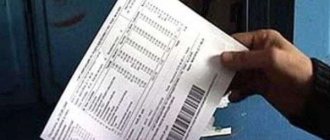What should be indicated on the receipt?
Every month, the homeowner receives a receipt indicating the amount of payment. It is a payment document confirming the right to charge payments for housing and communal services.
Organizations providing housing and communal services must indicate the following indicators in the receipt:
- name of the service;
- fee amount;
- volume of resource consumption (electricity, water, gas);
- cost of tariff and consumption standard;
- information about the owner (full name, address);
- established benefits, if any;
- details of the payment recipient;
- the period of time for which the fee is charged;
- owner's personal account.
What are membership payments?
Membership payments are included in the list of payments on receipts only for those houses in which a HOA is organized, since they are used to pay off the internal expenses of the housing organization. Such expenses include:
- remuneration of full-time employees;
- remuneration to the management of the housing association and the auditor;
- organization of additional services.
The organization of additional services (for example, a concierge or a 24-hour plumber) is carried out exclusively at the expense of membership fees, and residents who have not joined the HOA have the right to provide these services by signing contracts with the housing association.
The amount of membership fees is determined by the provisions of the organization’s charter, as well as decisions of general meetings documented in the form of minutes, and depends on the following factors:
- the number of residents of a house (or group of houses) who joined the organization;
- the ratio of the number of members of the housing association to the total number of residents of the house;
- the average area owned by a member of the partnership;
- number of residents of the municipality;
- Climatic features of the region.
ATTENTION! The more members there are in the HOA, the smaller the contribution can be assigned, but at the same time, the large number of residents of the house in relation to the number of those joining the housing association necessitates an increase in the amount of the monthly payment.
This is due to the fact that the cost of additional services usually depends on the number of square meters served, and not on the number of owners of such meters.
The obligation to pay membership fees arises only for those residents of an apartment building who have joined the partnership, but if apartment owners who are not members of the organization actually consume services paid for from the contributions of HOA members (for example, use a new entrance door), they are required to pay these services in an amount proportional to the area occupied by such residents.
In addition to regularly accrued fees, there are also one-time entrance fees that must be paid by each owner of the premises who decides to join a housing organization.
Such payments are used to pay off organizational expenses associated with the founding meeting and registration of the created housing association with the tax service.
The amount of entrance fees usually ranges from 500 to 2000 rubles. Depending on the size of the housing structure and the city.
All entrance and membership fees to the partnership's cash desk are part of the funds of the HOA as a legal entity; these funds are disposed of by the board upon the proposal of the general meeting (clause 2 of Article 151 of the Housing Code of the Russian Federation).
What is included in housing and communal services payments?
Costs associated with paying for housing and communal services are usually divided into two categories:
- Property maintenance and repair services are various works related to the improvement of the local area, the necessary repairs of the building and its maintenance, and sanitary services. Housing work is carried out both by the HOA itself and by housing construction cooperatives or management companies.
- Utilities are the provision of vital resources to residents. These include water supply with hot and cold water, gas, heat, electricity. Utility services are provided by the relevant enterprises - RSO, which are engaged in water supply, sewerage, and energy supply works.
According to Article 155 of the Housing Code of the Russian Federation, the deadline for payment of housing and communal services is established - until the 10th day of each month . The period may be different if this is agreed upon and specified in the owner’s agreement with the HOA. According to Article 153 of the Housing Code of the Russian Federation, payment for housing and communal services is the responsibility of every homeowner.
Note! The fact that the owner does not live in the apartment is not a reason for non-payment of utilities. Payment can be made not only by the owner or resident of the apartment, but also by the renter.
Payment of utilities in HOAs - terms, cash, procedure
In accordance with Article 157 of the Housing Code of the Russian Federation, payment for the provision of utility services is carried out according to the volume of energy consumed. Calculations are carried out based on the received data from metering devices.
Tariffs are set by local governments.
Tariffs set for hot water, heating and sanitation cannot be changed. If there are communal meters, then the amount of energy expended is distributed in equal shares among the owners.
In this case, the decision to approve standards based on instrument readings is made at a meeting of HOA members.
The list of repair services, the choice of the company to provide them, and the cost are also determined at the general meeting.
Payment is made on the basis of contracts in accordance with certain conditions in them.
Payment for utilities in the HOA is carried out on the basis of an agreement.
It states:
It must also be stated that the HOA representative acts on the basis of ownership and enters into an agreement for the provision of utilities and maintenance.
Such an agreement is concluded on the basis of paragraph 2 of subparagraph 2 of Article 161 of the Housing Code of the Russian Federation. Its conditions are the same for all owners of residential premises.
According to the contract, maintenance of the house and repair work must be carried out.
Utilities must also be provided in accordance with the agreement concluded between homeowners and utility services.
Here is a sample agreement between the owner and the HOA for maintenance.
Under the agreement, the owner instructs the partnership to provide services for:
- providing and performing various works;
- maintenance of residential property.
The HOA is also obliged to guarantee the uninterrupted provision of utility services:
- hot, cold water supply;
- drainage;
- heating;
- power supply
And the owner, in turn, must pay for all services provided on time.
Organization's activities
The HOA controls the entire process of providing utilities and their payment. If meters are installed on the house, then the HOA must distribute the energy expended evenly among all owners.
By law, the HOA is required to provide all data and all payment information. This means that the amount of payments must be fully recorded in the accounting department.
It should specifically indicate:
- what tariff is chosen;
- Full name of the payer;
- information about payment for additional services.
It is worth noting that the HOA does not have the right to redistribute funds received to pay for utilities. This means that if the owner paid 100 rubles for the provision of cold water, then the entire amount should go to this account in full.
A direct violation would be the case when money intended to pay for water goes to the account of an organization engaged in waste removal.
Payment of utilities in the HOA
Refusal of membership in the partnership is not a basis for refusal to pay for home maintenance services.
Any expenses incurred by the HOA for the operation and maintenance of common property must be agreed upon at a general meeting of residents.
If everyone agrees on the amounts, then there are no problems. Otherwise, everything is resolved in court.
It is impossible to refuse the provision of utilities. If a person lives in a house, then he is obliged to pay for everything, since it is impossible to leave any part of an apartment building without resources.
Deadlines
Payment of utilities in HOAs has a limited time frame. Payment for the use of services must be made no later than the 10th day of the next month.
Only other terms established by the contract can be specified in the management contract (Part 1 of Article 155 of the RF Housing Code).
The billing period is determined as 1 calendar month. Payment for the maintenance of residential premises must be made strictly on time, otherwise fines and penalties will be assessed.
According to Part 14 of Article 155 of the Housing Code of the Russian Federation, penalties are calculated at the rate of 0.03 of the refinancing rate of the Central Bank.
Cash
The Civil Code provides for cash and non-cash payments.
It is worth paying special attention to payment for housing and communal services:
- The HOA has the right to independently issue receipts if communal meters are installed;
- Payment for accruals can be made either in cash or by bank transfer;
- if any payments are made to the HOA cash register, then a cash register is not required, since such amounts are not considered revenue.
What to do if your invoices are too high?
If there are suspicions about dishonest accrual, then you should look into the situation. If guilt is proven, you can go to court.
But to ensure that the accusations are not unfounded, you should prepare:
- contact the partnership for clarification on where the extra charges came from;
- If the board of the partnership did not give any explanations, or discrepancies were identified with the data, then you should submit a statement to the prosecutor's office or the Housing Inspectorate.
The board of directors of the partnership does not have the right to refuse to provide clarifications and accounting information. That is, all information on payments must be written down.
If violations and errors are detected in the calculation of payments, the prosecutor's office will conduct an inspection.
The Prosecutor's Office or the Housing Inspectorate will study information about the legality of the creation of the HOA and its activities:
- if violations are confirmed, the HOA will be subject to liquidation.;
- The board of a partnership involved in fraud is obliged to pay a fine.
Without lawsuits and the involvement of authorities, it is impossible to legally combat fraud in HOAs. If a citizen stops paying bills, he will accumulate debt.
Owners who are not members of the HOA
The terms and procedure for paying utility bills in an HOA are the same for all homeowners.
Even if apartment owners are not members of the partnership, they are not exempt from mandatory payments.
It is impossible to refuse to provide services, even if the owner does not need them. The HOA enters into an agreement with utility organizations; it is impossible to make the same one for yourself personally.
Video about additional fees for residents in HOAs
Attention!
- Due to frequent changes in legislation, information sometimes becomes outdated faster than we can update it on the website.
- All cases are very individual and depend on many factors. Basic information does not guarantee a solution to your specific problems.
That's why FREE expert consultants work for you around the clock!
APPLICATIONS AND CALLS ARE ACCEPTED 24/7 and 7 days a week.
Source: https://77metrov.ru/oplata-kommunalnyh-uslug-v-tszh.html
Who sets tariffs and how?
Tariffs are set by resource suppliers. All resource supply companies are monopolists, so they regularly increase prices for services for the population, explaining this by increasing their own costs.
The Ministry of the Russian Federation applies the indexation method to monopolistic companies . Because of this, prices increase by the cost of index deflators. Homeowners have no right to choose; they are forced to pay bills in any case.
Many independent experts agree that the cost of housing and communal services is significantly exceeded and can be reduced by almost a third. In many ways, this situation is due to the fact that regional leaders have the opportunity to set local tariffs, which are several times higher than the state ones.
Membership fees in SNT Law 2020
TSN has the right to spend money only on business needs, remuneration of employees, acquisition of common property for TSN, repair of common property and equipment, construction of common property, purchase and repair of roads, paperwork. TSN does not have the right to make profit from its activities.
That's why I see that all dachas have begun to be sold on an accelerated basis. The common people cannot afford to have both an apartment and a dacha, thanks to the new law. If you have to pay for water from your own well, then who needs such a dacha? People don't have money. What should pensioners do if their dacha feeds them?
How to calculate the amount of payment for housing and communal services?
Calculating the amount to be paid for utilities is very simple. To do this, it is necessary to multiply the current tariff by the readings of metering devices (meters) or by the established consumption standard, which is formed by the municipality, based on the degree of improvement of housing.
Instrument readings must be taken monthly . They are individual and may be different every month. The meter data depends on the degree of consumption of the service (water, electricity or gas).
Reference! A certain category of citizens is entitled to a subsidy (pensioners, low-income people, disabled people). It compensates for part of the costs of paying for housing and communal services and its amount is set by the regional social protection service.
Drawing up an agreement with the property owner
If a homeowners association is organized in the house, then, as a legal entity, the partnership will conclude all contracts with the RSO for the provision of utility services in its own name.
This greatly facilitates the work of utility providers, since it is much easier for them to conclude one agreement with the HOA than tens or hundreds of agreements with each resident of the house.
Thus, the HOA acts as a kind of intermediary between the RSO and the residents of the house , with whom it also enters into a corresponding agreement. This agreement must specify the list of utilities used by the tenant, indicate the tariffs and obligations of the parties.
Residents undertake to make timely payments for consumed resources, the HOA is obliged to monitor the correct calculation of bills in receipts, and, if necessary, recalculate.
Attention! There may be residents in the house who do not want to become members of the HOA, but at the same time, they use all utilities (electricity, water, gas) on an equal basis with others. The HOA also enters into a separate agreement with such owners for the provision and payment of utilities.
Is it possible to pay for utilities without the participation of a partnership?
The Housing Code of the Russian Federation regulates the services, activities and structure of HOAs. Partnerships have the right to establish the amount of payments for residents for house maintenance, enter into an agreement with homeowners, approve estimates of annual expenses, provide services to residents of the house, rent or sell property owned by the HOA.
According to the Housing Code of the Russian Federation, all homeowners are required to pay utility bills. It is impossible to pay for utilities without the participation of the HOA, if the apartment building is managed by a partnership.
Payment of utilities in a homeowners' association: nuances and implementation rules
The homeowners association acts as a management organization for the property of apartment buildings.
In addition, in accordance with the provisions of the Housing Code of the Russian Federation, the HOA may be required to enter into agreements with resource supply organizations, including to ensure the utility needs of the building in which such an organization operates.
However, in connection with recent changes in current legislation, there is a question about what rights and responsibilities generally exist for a homeowners’ association in the field of public services, including if the HOA acts as an intermediary between property owners and resource-supplying organizations.
What rights does an HOA have in relation to the provision of utility services?
Since the creation of a homeowners’ association is the need to choose an option for managing common property and territories in an apartment building, the question arises: what rights does such a management organization have in relation to utilities? This issue is very acute, since the latest changes in housing legislation that occurred after the November 2020 initiatives of the President of the Russian Federation, made it their goal to change the current system of mutual settlements between consumers of resources and utilities and their suppliers represented by resource supply organizations.
This article talks about typical ways to resolve the issue, but each case is unique. If you want to find out how to solve your particular problem, call :
- Moscow.
- Saint Petersburg.
Or on the website. It's fast and free!
Currently, the homeowners association, represented by its authorized employees, has the right to:
- check indoor metering devices (but only if we are talking about those houses where general house metering devices are installed, and such checks are aimed at identifying debtors or persons consuming certain resources illegally);
- collect contributions for major home repairs (if such a right was granted to the established partnership as part of the decision to create it and approve the list of actions that this management organization can carry out);
- in case of identification of debtors for payment of utilities and contributions for major repairs, act as plaintiffs in court , if we are talking about the presence of debt for at least twelve months (before the formation of debt for such a period, the conflict situation must be resolved through pre-trial settlement);
- if the right to collect funds for major repairs of a house is transferred by making an appropriate decision of the meeting of owners of premises in an apartment building to the owner's association, the HOA has the right to charge penalties for non-payment of contributions for major repairs if a debt arises from one of the owners in the amount calculated in accordance with with special formulas.
However, each of the listed actions, except for checking the metering devices installed inside the apartments, must be carried out in strict accordance with the decisions made by the meeting of owners of the premises in the building managed by the HOA.
How do you pay for utilities?
Payment for utilities within a homeowners' association can be carried out in several ways, the specific choice of which is carried out at a general meeting of owners of premises in a building managed by such a legal entity.
Payment options to consider:
- non-cash payment for services received on the basis of an agreement with the partnership by transferring funds to special accounts, from which funds are subsequently transferred to resource supply organizations;
- payment for services by making the necessary payment using cash payments to the partnership cash desk;
- direct transfer of funds to the accounts of resource supply organizations based on the conclusion of a direct agreement between the consumer of certain public services and their suppliers.
If the transfer of funds for consumed resources and utilities is carried out to a resource-supplying organization through a homeowners’ association, the association, as a representative of the premises’ owners, is obliged to make all payments in a timely and efficient manner, and in the case of debts on the part of consumers, to carry out work aimed at repayment of such debts.
If the choice of the owners of premises in an apartment building fell on the HOA as an intermediary in the transfer of funds to resource supply organizations, special accounts must be opened in the partnership from which funds will be transferred to a specific supplier of utilities and resources.
At the same time, in accordance with the provisions of the current legislation in the field of housing and communal services, the homeowners’ association does not have the right to redistribute the funds received (for example, funds that were paid for garbage removal by residents of the house cannot be transferred to electricity suppliers even if, according to article payments for electricity have accumulated a significant debt).
If the choice fell on the independent conclusion of contracts by the owners of premises with resource supply organizations, then a special procedure is provided for this option.
How can I pay for receipts?
Payment for housing and communal services is made in banks, at the post office, via the Internet or using payment terminals. After which the money goes to the personal account of the housing and communal services supplier.
Bank cash desk or terminal
The payment process occurs as follows: the payer comes to the bank, through the service terminal (if available) selects the operation: “Payment for housing and communal services”, receives a number and waits for his turn. If the bank does not have a terminal, the payer takes the general queue.
After the turn has come, the payer provides a receipt for payment and a passport, pays the amount indicated on the receipt, and collects the check. The payment will be credited in the next few hours. Some banks charge a commission for paying utility bills ; the cashier will definitely warn you about this.
Payment at the post office is made in the same way. The disadvantages of paying this way include the fact that the payment may not be credited immediately, but after a few business days. There is an important advantage - the post office does not charge a commission.
To pay for utilities, you will need receipts and a passport (it is not required everywhere, but it is better to have your passport at hand).
Internet
Payments for housing and communal services can be made via the Internet. This opportunity can be used by every person who has a network connection. Payment is made based on a receipt and can be made in the following ways:
- through electronic payment systems, for example “Rapida”;
- through online banking services, for example Sberbank Online.
Sberbank Online
To pay via Sberbank Online (the payer must have an open account with Sberbank and connected Mobile Bank) you need to register.
Payment through the service is carried out in the following way:
- On the main page you must enter your login (identifier) and password.
- At the top of the screen, select the “Transfers and Payments” tab.
- At the top of the page, indicate your region, then, in the “Housing and communal services and home telephone” section, select “Rent”. To search for an organization whose services you need to pay for, in the large empty field, indicate the full name of the organization, or its tax identification number, or the current account into which you will pay on the receipt and click the “Find” button.
- Select your service provider.
- Enter the necessary details - which service needs to be paid for, from which account the money needs to be debited and the single number indicated on the receipt.
- Please check the receipt carefully for the amount due and the notice number. Enter your meter readings and click on the “Continue” button.
- If, after checking the information, there is a need to make changes, click on “Edit”; if everything is in order, click on “Confirm by SMS” (if desired, you can select other payment confirmation methods).
- The code received in the message is entered in the appropriate field, then click on “Confirm”.
- If the payment was successful, the system will show you its status - “Completed”. If desired, you can print the payment receipt, save the payment as a template, or repeat the operation.
Rapida
Attention! To use this method, the user must have a Rapida system payment card, from which money will be debited to pay for utilities.
Payments to the HOA for housing and communal services through the Rapida electronic system are as follows:
- On the main page of the site, select the “Private Clients” tab.
- Click on the “Payment for housing and communal services” icon.
- Next, the system will offer to go to the “Rapida Online” section, which can be done simply by clicking on the underlined text.
- To make a payment and create a receipt, enter the data that the system requests - full name, address, payer account number and payment amount, then click “Create”.
Targeted contributions to the HOA
What it is? Targeted contributions to the HOA are understood as regular payments made by residents-members of the housing association to the organization's cash desk for certain purposes, established by housing legislation and the charter of the HOA.
Such goals may include:
- organization of major repairs;
- replenishment of the reserve fund;
- carrying out seasonal repair work.
REFERENCE! The amount of fees for replenishing reserve funds and carrying out seasonal work is determined by the provisions approved at the general meeting of tenants-members of the housing association (part 4 of clause 2 of article 145 of the Housing Code of the Russian Federation).
The amounts of payments, the intended purpose of which is capital repairs, are determined by the regional government, and they can be increased by the charter of the housing association, but cannot be reduced. Their value ranges on average from 150 to 350 rubles.
How can a partnership deal with defaulters?
Some residents may not pay simply because of their dishonesty, but there are other debtors who are not able to pay utility bills in full for their own objective reasons (illness, low material income, etc.).
At the same time, it is important for all HOA chairmen to monitor the timely receipt of payments and talk with debtors even if the arrears in payment of housing and communal services do not exceed 2 months.
If citizens continue not to pay utility bills, then the HOA may begin to apply the following sanctions to defaulters:
- accrual of penalties for late payments;
- issuing written notice to the debtor stating that services will be limited or suspended;
- restricting the provision of housing and communal services (this method is used when the debtor does not repay the debt within 30 days after receiving the notification);
- if, after all the measures taken, the debtor still does not pay utility bills, the HOA has the right to file a lawsuit to force collection of the debt.
Modern life is impossible without the use of services from the housing and communal services sector. Limiting electricity, heating or water supply inevitably entails a number of inconveniences. Therefore, payment for housing and communal services must be made on time to avoid unpleasant consequences.
Applying to court for debt collection
Reference! If the arrears in payment for utility services exceed six months, the HOA representative has the right to notify the homeowner in writing that the provision of housing and utility services will be suspended. A month is given to repay the debt.
If, after a month, the debt has not been repaid (or at least part of it), then the HOA may restrict housing and communal services, and then have the right to go to court with a demand to repay the debt forcibly.
The plaintiff in a case of debt collection for utility bills is usually a homeowners association, TSN or a management company. When filing a claim in court, it is necessary to indicate the circumstances leading to the violation of the rights and interests of the plaintiff. The statement of claim should also indicate the plaintiff's demands.
The following package of documents is attached to the claim:
- a copy of the HOA charter;
- receipt of payment of state duty;
- copies of notices that certify the defendant’s debt;
- power of attorney, which certifies the authority of the plaintiff;
- a copy of the statement of claim;
- management agreement;
- rental agreement for premises (if the tenant turns out to be a tenant).
If the debt is below 50,000 rubles, the claim is filed in the magistrate’s court; if the debt exceeds this amount, the claim is sent to the district court.
How to pay utility bills in a HOA (homeowners' association)
Living in a residential building to which utilities are supplied, such as water, gas, electricity, obliges the owner or residents to pay monthly for the consumed goods.
It doesn’t matter what type of real estate your home is - a private house, an apartment, a country cottage or a house in a garden community.
But the methods of accrual, notification and actual payment for the consumed volume of utility resources can vary significantly depending on whose management the residential building is located.
Homeowners' associations (HOA) are organized with the aim of creating more favorable and transparent conditions for charging utilities.
In this article, we will look at what constitutes the basis of the activities of an HOA, the responsibilities of residents in relation to paying for utilities, how HOA agreements are concluded with service providers, as well as some nuances of actions in case of incorrect calculation of rent.
If you live in an apartment building and are a member of a homeowners' association, then many issues related to common real estate are resolved at a meeting of residents.
This also applies to the issue of concluding an agreement for the payment of utility services.
By a common decision of all homeowners, it is decided which supplier the cooperation will be carried out with, and an agreement is concluded for the supply of utility resources or services.
The main points in such an agreement are:
| Full name of the homeowners association | personal data of the chairman (last name, first name, patronymic) |
| Reasons for taking such actions | charter, memorandum of association, etc. and conditions of imprisonment |
| Rights and obligations of the service provider parties | provision and provision of public services, maintenance, repair work, etc. |
| Rights and obligations of the HOA | monthly payment for consumed resources based on metering devices or current standards |
Also, each homeowner enters into an agreement with the HOA to provide him with the necessary utilities.
According to it, the owner of property in an apartment building instructs the partnership to carry out the following:
- ensure uninterrupted supply of utilities to the owner’s apartment;
- maintenance of common residential property;
- performing various works related to the repair and maintenance of common property.
Currently, almost all apartment buildings are equipped with individual meters for metering the consumption of utility resources and a common building one.
The main calculation of the cost of payment is based precisely on the readings of the meters installed in each apartment and in the common entrance.
As for tariffs for individual utilities, this financial category is not under the jurisdiction of the partnership.
Tariffs for hot water, heating and sanitation are set by local governments.
Activities of the partnership
A homeowners' association is the result of the free will of all apartment owners in an apartment building.
Such an organization is created in order to protect the interests of the residents of the house and represents a “buffer” between consumers of utility services and suppliers of resources and services.
The main activities of the HOA are:
- Ensuring the operation of an apartment building.
- Ensuring the use of apartments in an apartment building.
- Ensuring ownership, use and disposal of common property in an apartment building.
- Providing utility services to persons using premises in apartment buildings or these residential buildings.
When charging for utilities consumed by homeowners and other persons living in an apartment building, the HOA is required to conduct professional accounting activities.
At any time, upon request of the general meeting of residents, a report on the financial activities of the HOA must be promptly created and submitted, which indicates:
- selected tariff;
- personal data of the payer (last name, first name, patronymic);
- information on payment for additional services (cable television, cleaning of staircases and stairs, etc.).
: creation of a homeowners association
It is important to remember that if the HOA received money from a tenant to pay for certain utilities, then the partnership has neither the legal nor the moral right to direct them in a different direction.
That is, money paid for the provision of hot water according to a utility bill cannot be paid to the supplier providing heating services, etc.
Residents' responsibilities
Unlike the management of an association, which has many obligations to residents, owners are required to fulfill few obligations.
The most important thing is timely payment in full of utility bills for the reporting period. It is important to remember this for all homeowners in an apartment building.
Long-term non-payment of bills by one of the apartment owners and the unwillingness to peacefully resolve the negative financial situation that has arisen ultimately leads to the fact that the utility service provider goes to court with a claim for debt collection.
But the defendant will not be the willful defaulter, but the organization itself, since the contract for the provision of services is concluded between the partnership and the supplier, without specifying individual subscribers.
As a result, the HOA will be forced to pay the debts of unscrupulous residents from the general building funds reserve.
Reflections in the law
Homeowners' associations are quite serious non-profit organizations, therefore all their activities, from creation to resignation, are clearly regulated and controlled by Russian legislation.
We list the main legal acts and articles:
Choosing payment for utilities in the HOA
The Housing Code of the Russian Federation states that every person (owner, tenant, tenant, etc.) living in a residential building and using utilities is required to pay for them.
When permanently residing in an apartment, the list of services required to pay includes:
- Payment for consumed utility resources according to the tariff or current regulations.
- Payment for the maintenance and repair of housing (including shared housing).
At the same time, the owners of premises in an apartment building are required to pay not only for current, but also for major repairs of the property of the building, which is in common use of all owners.
When creating a homeowners' association, responsibility for ensuring that residents fulfill their obligations rests with this non-profit organization.
It is important to remember that even if you have not become a member of the organization and do not want to have anything to do with it, being a single owner, this does not relieve you of the obligation to pay for utilities and expenses for maintaining common property in proper condition.
In cash
The Civil Code of the Russian Federation has determined and legalized the ability of each homeowner to pay their monthly expenses for utilities and home maintenance.
They can be made either by bank transfer or by depositing cash into the account of the supplier company through payment points.
The homeowners' association has the authority to independently generate, print, and send payment documents (receipts) to the residents of the house to pay for utility services.
Payment in cash can be made directly to the HOA cash desk. It is important to remember that the presence of a cash register in the management of the partnership is not a charming attribute, since the funds contributed by the owners and residents of the apartment building are not revenue.
When?
Restrictions regarding the timing of payment for utility services are national, enshrined in the Housing Code of the Russian Federation and are not the prerogative of the HOA.
Article 155 of this legal act states that every owner, tenant, tenant, etc., who enjoys the benefits of civilization, is obliged to pay them monthly in full no later than the 10th day of the month following the reporting period.
That is, for utilities consumed in December, you must pay before January 10.
Violation of payment deadlines for bills for used utility services entails the application of penalties both from the HOA and from the resource supply company.
Moreover, the last authority will direct its “anger” towards the entire house. Concluding an agreement with a partnership entails sad consequences for all residents of the house (temporary interruption of the supply of a utility resource, complete disconnection from the supply, etc.), and not just for a specific defaulter.
Actions in case of inflated invoice amounts
Sometimes situations arise when apartment owners - members of the cell - doubt the correctness of the calculation of payments for consumed utility services.
In such a situation, it is worth contacting the accounting department and the board for clarification and provision of additional information.
Refusal to provide financial statements is a violation on the part of the HOA and is a serious reason for contacting the prosecutor's office or the Housing Inspectorate.
Owners who are not members
Not all owners of apartments in a multi-storey building become members of the HOA. To join, a personal statement from the apartment owner is required, as well as a decision of the general meeting.
But the status of a member of a homeowners’ association or the absence thereof does not relieve the responsibility of citizens living in this house and using public utilities to pay for them in full.
In an apartment building, it is impossible to decide not to use, for example, heating, even if you do not live in the residential premises you own during the cold season.
Paying utility bills is an integral part of the life of a modern person.
And it doesn’t matter at all who manages the house - the HOA or the management company.
Source: https://domdomoff.ru/oplata-kommunalnyh-uslug-v-tszh.html









